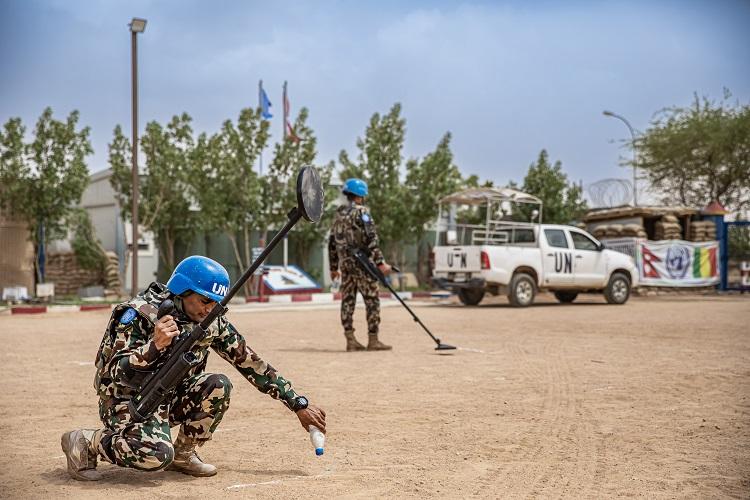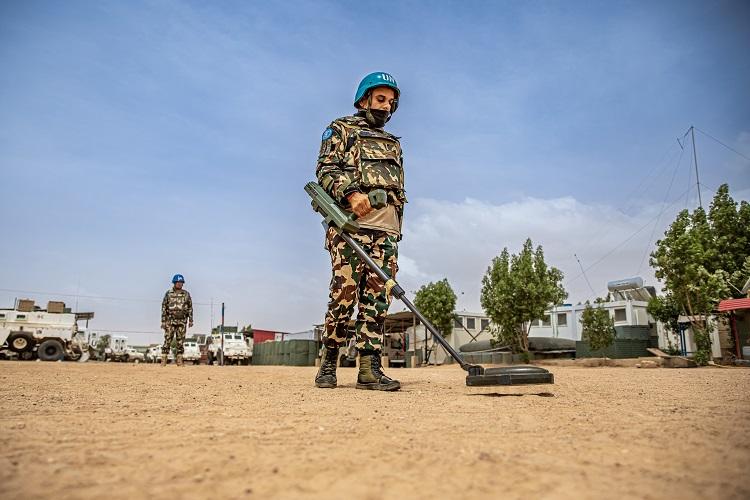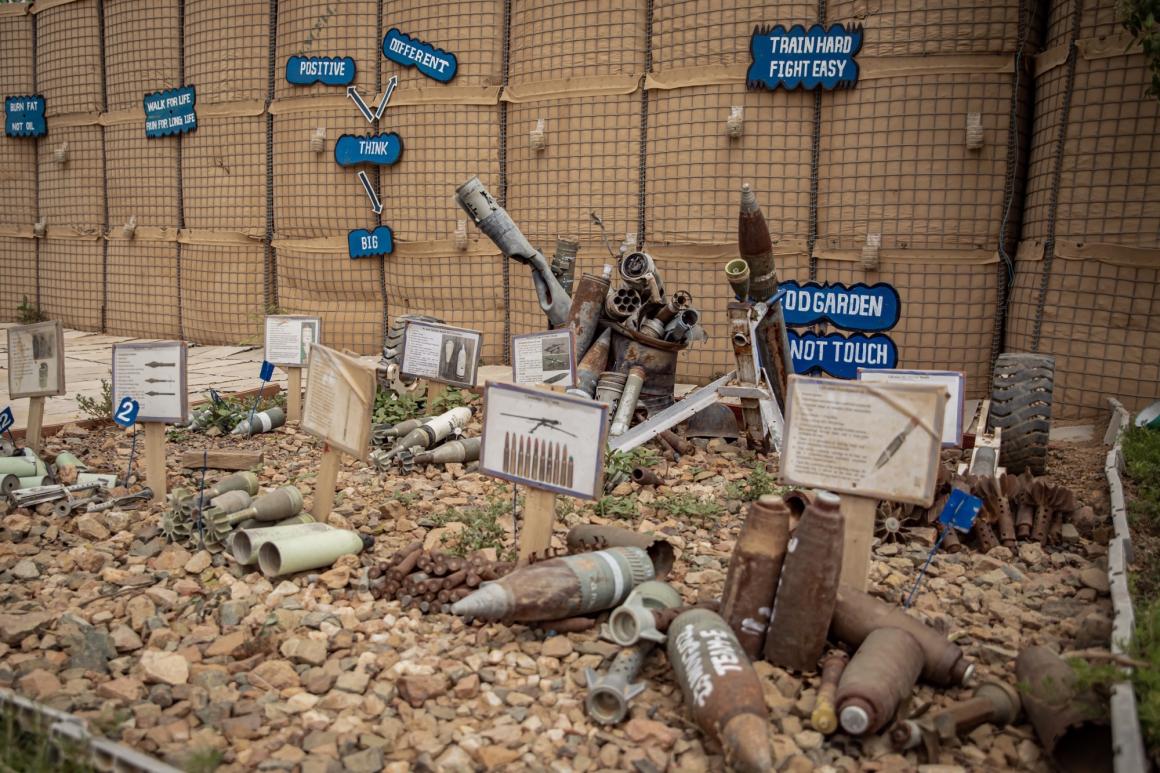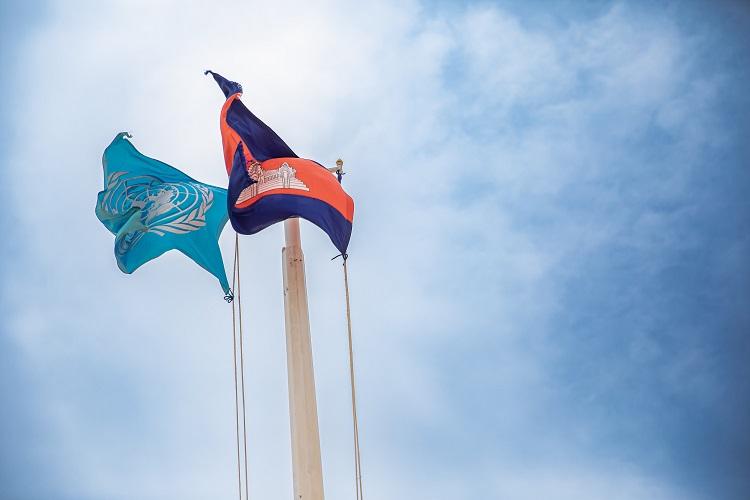As MINUSMA inches closer to its withdrawal from Mali by 31st December 2023 in line with UN Security resolution 2690, it is important to acknowledge the significant contributions of the Nepal Explosive Ordnance Disposal company to the implementation of the MINUSMA’s successive mandates in the past decade. Their core mission was to mitigate the IED threat, which involved investigating IED incidents, disposing of IEDs, and analyzing IEDs after they had exploded. In 2023 alone, the Company completed 62 major missions, ranging from convoy support and post-blast investigations to hands-on IED disposal, including in March 2023 when they neutralized two intricate remote-controlled IEDs found near their Kidal base.

The challenge
Since the establishment of MINUSMA in Mali in 2013, IED and landmine attacks have consistently targeted convoys and patrols, particularly in the north and center of the country. The use of IEDs by armed elements in these regions has also affected human security. For example, since January 2018, 696 civilians and more than 390 peacekeepers have been injured in IED explosions, with several of these injuries occurring during the current drawdown.
The challenges posed by these explosives, as well as the casualties and injuries suffered by peacekeepers, underscore the difficult operating conditions they endure. Improvised explosive devices have tragically claimed the lives of 109 peacekeepers. The highest number of IED-related casualties in a single day was recorded on 18 September 2014, when five Chadian peacekeepers died in an IED attack.
In the year 2023 alone, the Nepal Explosive Ordnance Disposal company undertook 62 major assignments, spanning a range of operations from convoy support and post-blast investigations to hands-on IED disposals, including in March 2023, when they neutralized two intricate remote-operated IEDs found close to their Kidal base. Most recently, they had to intervene when MINUSMA withdrawal convoys were targeted by IEDs. These incidents are a sad reminder of the high risks the Mission has faced over the past decade and is still facing as it draws down from Mali.

Defending against the invisible threat
Stationed across key locations in the Northern regions of Mali — including Kidal, Aguelhok, Tessalit, and Gao — the Nepal EOD company first set foot in Mali in Feb 2014. Their deployment came as a response to MINUSMA’s increasing challenges with mines and IEDs. Each EOD team unit is a cohesive blend of specialists – from searchers, operators, and medics to drivers and gunners – with each member playing a pivotal role in their collective responsibility. The team is always ready to respond to IED alerts or findings within 15 minutes. They prioritize convoy safety, conduct comprehensive investigations, and execute necessary disposals.
The proficiency of the EOD units extends beyond meticulous investigations. They are well-equipped to manage complex disposal operations. EOD operations involve dealing with explosive devices such as IEDs, Mines, and Unexploded Ordnance, which pose significant risks to human life. In situations where convoys face explosive threats or detect IEDs, immediate safety protocols are activated. EOD experts delve deep into evaluations, and subsequent steps often involve the secure neutralization of the IEDs, facilitating the convoy's onward movement. Moreover, the team is responsible for safely discarding expired or non-functional ammunition and munitions from various contingents.

Intensive training and hands-on experience
The accomplishments of the Nepalese EOD company are based on preparation and skill, not chance. Prior to their deployment to Mali, they underwent eight weeks of intensive, mission-specific training focused on IED and EOD functions. Then upon arriving in Mali, they embarked on an additional three weeks of in-depth, in-mission training, familiarizing themselves with the mission environment and equipment essential to their field operations. The continuous training, combined with state-of-the-art technology, enabled MINUSMA to dramatically reduce IED-related casualties.
Lt. Colonel Bibek Kafle, Commander of the contingent, attests to the team’s unwavering commitment to skill refinement. “Our team dedicates each day to training. Whether in active deployment or based at headquarters, they never cease honing their expertise in IED management. This relentless pursuit of mastery ensures that they are adept at managing real-world challenges,” he observed as he reflected on a training session that simulated an IED disposal scenario. “In a typical training setup, we place IEDs and assorted wires, he added. “The goal is for the personnel to identify these threats, while the operators deftly manage a remote operating vehicle. This rigorous practice is a testament to our dedication to readiness. Our near-decade track record, especially in IED disposal, stands as a testament to our company's exceptional capabilities.”

Remote Operating Vehicles (ROVs) offer significant advantages for EOD operations in Mali. They are equipped with a variety of tools and attachments to accurately neutralize explosive devices. These include robotic arms and high-resolution cameras and sensors that provide real-time visual information and data about explosive devices and their surroundings, helping EOD team leaders identify potential threats, determine the best course of action, and ensure the safety of personnel and the surrounding area. Versatile, the ROVs can operate in urban, rural, and hard-to-reach areas. They are also able to operate from a safe distance or from a remote location away from explosive devices, reducing the risk of injury or death to EOD personnel. These advantages contribute to the effectiveness, efficiency, and safety of EOD operations, ultimately saving lives and protecting military personnel and local communities from the threat of explosive ordnance.
Bonding with the communities
The Nepal EOD company successfully accomplished additional mission objectives during its deployment. Through various civil-military activities at a local school and sports club in Kidal town, for example, the company gained the trust of the local population, strengthening the relationship between military forces and the community. This trust-building effort has led to improved security conditions and enhanced protection of civilian mandates.
Despite challenges such as cultural differences, language barriers, and coordination between military and civilian actors, the Nepal EOD company positively impacted the lives of 600 school children and sports club members in 2023.

Environmental Award
In a unique initiative, the Nepal EOD team established what they label as the “EOD Garden”. This is not a mere collection of souvenirs, but rather inert devices and components that serve as a testament to their work. It provides a visual representation as well as an educational resource on the explosive threats that they have been neutralizing over the years.
The company also initiated a tree planting program in northern Mali, particularly in the Kidal region. This initiative has resulted in a wide range of benefits for the region and its communities, including ecosystem restoration, climate change mitigation, improved water management, sustainable agriculture, economic opportunities, community resilience, and improved overall health and well-being. In recognition of their efforts to make Kidal greener and more environmentally sustainable, the Nepal EOD company received the inaugural Environmental Award from the MINUSMA Force Commander.



